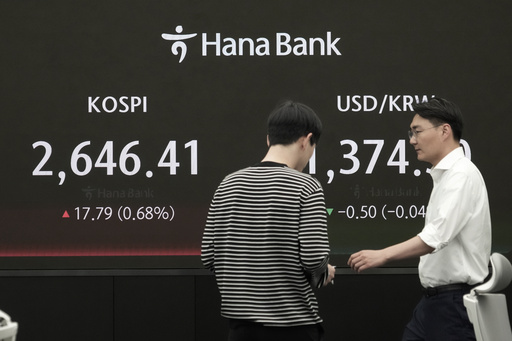TOKYO (AP) — Asian shares mostly rose Friday despite worries about the economic outlook and inflation in the U.S. and the rest of the world.
The Bank of Japan ended a policy meeting with no major changes, keeping its benchmark interest rate in a range of 0 to 0.1%. In March, it raised the key rate from minus 0.1%, citing signs that inflation had reached the central bank’s target of about 2%.
Japan’s benchmark Nikkei 225 added 0.4% in morning trading to 37,780.35, while the U.S. dollar was trading at 155.54 Japanese yen, little changed from 155.58 yen.
Although a weak yen is a boon for Japan’s giant exporters like Toyota Motor Corp., whose overseas earnings are boosted when converted into yen, some Japanese officials, including Finance Minister Shunichi Suzuki, has been raising concerns that an overly weak currency is not good for the Japanese economy in the long run.
In other currency trading, the euro cost $1.0726, up from $1.0733.
On Thursday, Wall Street was lower by worries about a potentially toxic cocktail combining stubbornly high inflation with a flagging economy. A sharp drop for Facebook’s parent company, one of Wall Street’s most influential stocks, also hurt the market.
The S&P 500 fell 0.5% to 5,048.42. The Dow Jones Industrial Average dropped 1% to 38,085.80, and the Nasdaq composite sank 0.6% to 15,611.76.
Meta Platforms, the company behind Facebook and Instagram, dropped 10.6% even though it reported better profit for the latest quarter than analysts expected. Investors focused instead on the big investments in artificial intelligence that Meta pledged to make. AI has created a frenzy on Wall Street, but Meta is increasing its spending when it also gave a forecasted range for upcoming revenue whose midpoint fell below analysts’ expectations.
Expectations had built high for Meta, along with the other “Magnificent Seven” stocks that drove most of the stock market’s returns last year. They need to hit a high bar to justify their high stock prices.
The entire U.S. stock market felt the pressure of another rise in Treasury yields following a disappointing report that said the growth of the U.S. economy slowed to a 1.6% annual rate during the first three months of this year from 3.4% at the end of 2023.
That undercut a central hope that’s sent the S&P 500 to record after record this year: The economy can avoid a deep recession and support strong profits for companies, even if high inflation takes a while to get fully under control.
That’s what Wall Street calls a “soft landing” scenario, and expectations had grown recently for a “no landing” where the economy avoids a recession completely.
Thursday’s economic data will likely get revised a couple times as the U.S. government fine-tunes the numbers. But the lower-than-expected growth and higher-than-expected inflation is “a bit of a slap in the face to those hoping for a ‘no landing’ scenario,” said Brian Jacobsen, chief economist at Annex Wealth Management.
Treasury yields still climbed as traders pared bets for cuts to rates this year by the Federal Reserve.
The yield on the 10-year Treasury rose to 4.70% from 4.66% just before the report and from 4.65% late Wednesday.
Traders are largely betting on the possibility of just one or maybe two cuts to interest rates this year by the Fed, if any, according to data from CME Group. They came into the year forecasting six or more. A string of reports this year showing inflation remaining hotter than forecast has crushed those expectations.
Top Fed officials have said they could hold its main interest rate for a while at its highest level since 2001. High rates slow the overall economy and hurt prices for investments, while cuts could help inflation reaccelerate.
That puts more pressure on companies to deliver bigger profits.
In energy trading early Friday, benchmark U.S. crude edged up 19 cents to $83.76 a barrel. Brent crude, the international standard, gained 22 cents to $89.23 a barrel.
___
AP Business Writer Stan Choe contributed.
This website uses cookies so that we can provide you with the best user experience possible. Cookie information is stored in your browser and performs functions such as recognising you when you return to our website and helping our team to understand which sections of the website you find most interesting and useful.
